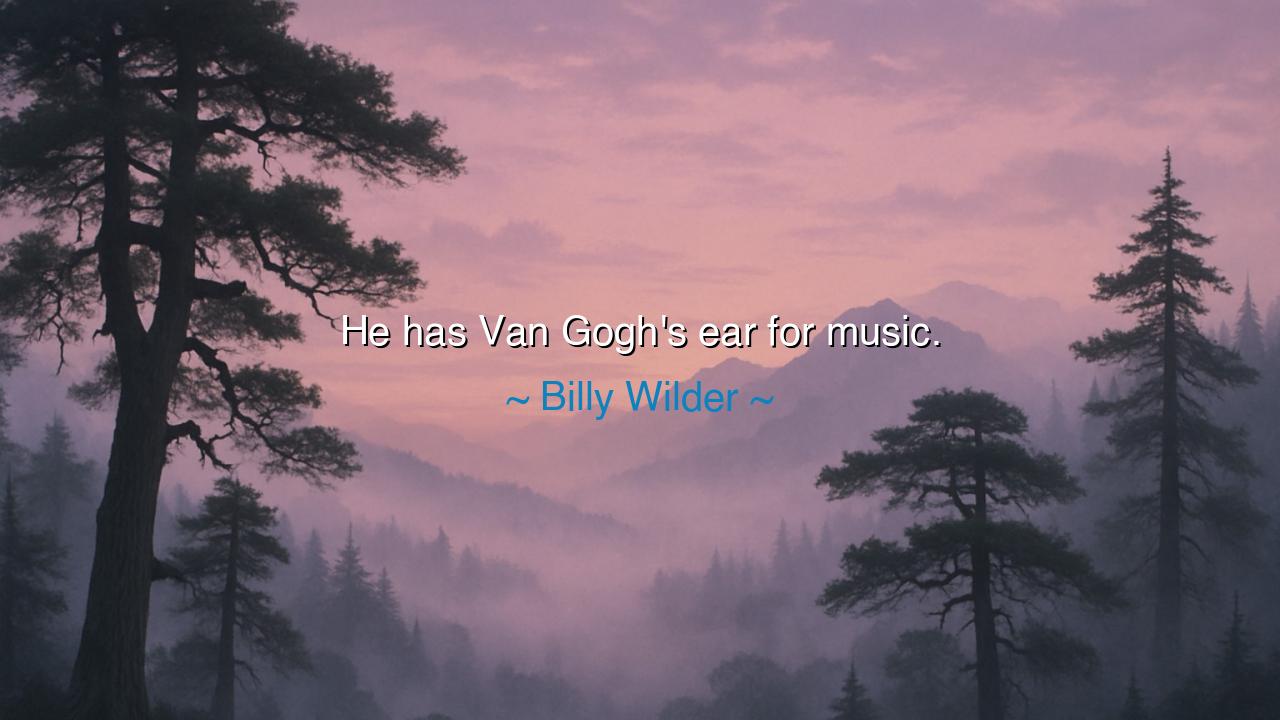
He has Van Gogh's ear for music.






When Billy Wilder quipped, “He has Van Gogh’s ear for music,” he clothed sharp humor in the garments of wit. At first hearing, it stings like a jest, but within it lies a deeper lesson: that not all gifts are shared by all men, and that genius in one realm does not guarantee mastery in another. Wilder, a master of cinema, invoked the tragic image of Van Gogh, the great painter who cut off his own ear, to describe one utterly lacking in musical sense. It is an image both biting and profound, a reminder that to excel in one thing does not mean we are equally endowed in all.
The ancients often spoke in parables of balance and limitation. They told us that Achilles, though swift and mighty, was undone by the frailty of his heel. They taught that even the strongest oak bends when lightning strikes. So too does Wilder’s quip remind us that even those most gifted may be blind—or in this case, deaf—to other realms of art. To have “Van Gogh’s ear for music” is to be utterly tone-deaf, to hear melody as chaos, harmony as noise. It is a comic truth, yet it conceals an eternal wisdom: no mortal is without weakness.
Consider the life of Vincent Van Gogh himself. His paintings—alive with color, trembling with soul, burning with emotion—changed the world of art forever. Yet in his lifetime, he was dismissed, impoverished, misunderstood. His genius was undeniable in one sphere, but his struggles in life, in health, and in spirit revealed the limitations of man. Wilder’s joke, while playful, reminds us of this paradox: the same man who gave us “Starry Night” had an ear not for music, but for tragedy. It is a lesson in humility and in the strange distribution of human gifts.
And yet, within the jest lies inspiration. For though Van Gogh may have had no ear for music, he gave the world a symphony of color. His brush was his instrument, his canvas his stage, his strokes his notes. In his own way, he made music visible, giving to our eyes what composers give to our ears. This reveals that weakness in one form can drive the flowering of genius in another. What is denied in one realm may be transformed in another, if only the spirit dares to create.
Wilder’s words can also be taken as a warning against vanity. Many boast of gifts they do not possess, claiming mastery without discipline, talent without labor. To such, the world offers laughter, not praise. For to pretend to hear music when one does not is to reveal folly. Better to accept one’s weakness with grace, and to labor where one’s gifts truly lie. In this honesty is strength, for it frees us to build upon what we have been given, rather than stumbling in pride over what we lack.
The lesson, then, is twofold: first, to recognize with humility the limits of our nature; second, to transform those limits into opportunities. If you cannot hear music, then perhaps you can see it in color, or feel it in movement, or shape it in words. If one door is closed, another may open, if only you are faithful to your spirit. Van Gogh’s ear may have been unfit for melody, but his eye beheld eternity.
Practically, this means we must not despair at our deficiencies, nor envy the gifts of others. Instead, look inward. Ask yourself: what is my brush, my canvas, my song? Where does my strength lie, and how can I use it to give light to the world? And if you must laugh, laugh as Wilder did—with wit, with sharpness, but also with understanding that weakness is part of the human story.
Thus, carry this wisdom: to have Van Gogh’s ear for music may be to lack one gift, but it does not mean the soul is poor. For genius wears many faces, and even in jest, the truth stands—our greatness is not found in having all gifts, but in cultivating the ones that burn within us like fire.






AAdministratorAdministrator
Welcome, honored guests. Please leave a comment, we will respond soon